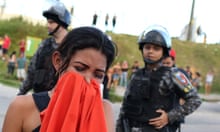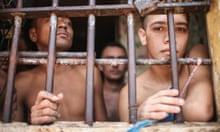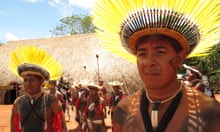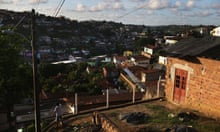As the lead prosecutor in Brazil’s biggest corruption investigation, Deltan Dallagnol had long been aware he was making history, but he only appreciated the case’s impact on the country’s people when a stranger stopped him in the street to give thanks.
“He said he had cried when he saw the prince of a huge company being arrested because it made him realise the law is being applied equally. He never imagined something like that happening in Brazil,” the young lawyer recalled. “A lot of people have put their hopes in us.”
There cannot be many graft investigations in the world that prompt tears of gratitude, but for millions of Brazilians, a string of high-profile arrests have been a source of solace in an otherwise dismal year – a sign that some of the country’s institutions are functioning effectively, even with the economy suffering its worst crisis in decades and parliament riven by an impeachment struggle.
The Lava Jato (Car Wash) investigation headed by Dallagnol is, however, partly responsible for the chaos. Overturning decades of impunity, it has charged more than 70 political leaders, lobbyists and captains of industry with bribery, tax evasion or misuse of public funds.
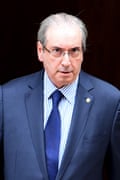
This has paralysed several industries, adding to the decline of GDP. It has also contributed to a vicious battle in congress, where the speaker of the lower house, Eduardo Cunha, has initiated moves to remove President Dilma Rousseff as a tactic to dodge accusations that he accepted $5m in bribes from the state oil company Petrobras.
Critics say the investigation has gone too far, that it rides roughshod over the law and that a clique of populist justice officials are undermining the authority of elected officials in the government and legislature.
In an interview with the Guardian at his bustling office in Curitiba, Dallagnol says the opposite is true.
“This shows our institutions have been maturing since the constitution was put in place,” he said, referring to the immediate post-dictatorship era in the late 1980s when prosecutors, federal police and judges were given more autonomy and power. “The fault is not with investigators but with those who committed corruption. Once they do that, it gives power to legal agents to prosecute them and seek proportionate punishment according to the due process of the law.”
The Harvard-trained prosecutor is, at first sight, an unlikely agent for change. A devout Christian, he looks younger than his 35 years. His office is relatively small: just 11 prosecutors and 50 support staff.
Somewhat awkwardly, they share a building with Petrobras and Odebrecht – two of the companies they are investigating – an arrangement which leads to some painful silences in the elevators, according to one of Dallagnol’s aides.
Their base in Curitiba – the capital of Paraná state – is unfashionable, but its distance from the power and wealth in Brasília, São Paulo and Rio de Janeiro is also a source of independence and strength. The prosecutors have found an ally in local judge Sérgio Moro, and worked well with federal police and tax officials, according to Dallagnol.
“In theory we could have cases like this everywhere in Brazil but it doesn’t happen,” he said. “Here, there were a lot of necessary conditions. It was a conspiracy of the universe, an alignment of the planets, a God-given opportunity for change.”
The results have been startling. The investigation started as an inquiry into a money-laundering operation at a car wash, and has retained the name Lava Jato even as it mushrooms to encompass other illegal activities.
Since those apparently inconsequential beginnings, it has uncovered nationwide corruption at the state-run oil firm Petrobras, which was being used to channel campaign funds to most of the main political parties.
The investigation has since widened to include construction companies, Swiss bank accounts, Rolls-Royce and a Dutch offshore drilling platform builder. In the latest twist in the past week, there have been raids on senior members of Brazil’s biggest political party, the PMDB and revelations that the graft may extend to Olympic projects.
Those charged so far make up a Who’s Who of Brazil’s elite. They include the head of Brazil’s biggest building firm, Marcelo Odebrecht; the former head of investment bank BTG Pactual, André Esteves; the head of the senate, Renan Calheiros; the treasurer of the ruling Workers party, João Vaccari, and dozens of senators and deputies. All deny wrongdoing. Others have been called for questioning, including former president Luiz Inácio Lula da Silva.
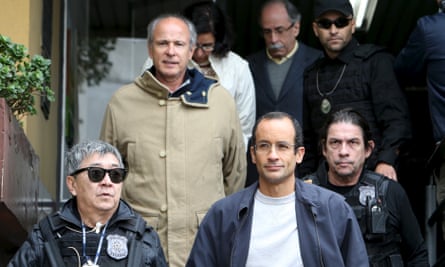
More can be expected. “We have an environment that is corrupt. It’s endemic. It has spread like a metastasis of cancer so this case could take us anywhere,” says Dallagnol, who says the $6.2bn of corruption uncovered so far is likely to be only the tip of the iceberg.
Asked if he believes anybody in a high position in Brazil is clean, he smiles and then pauses for several seconds, while he chooses a diplomatic answer. “We believe there are good and bad people in any institution.”
The key to the investigation’s success has been cooperation agreements with suspects, who have been promised reduced sentences in return for handing back bribes and giving testimony against others involved in the case. With the support of Judge Moro, Paraná’s police and prosecutors have persuaded 19 defendants to sign such bargains.
This unsettles some legal experts, who say the police, prosecutors and judges in Curitiba are violating rights in order to secure cooperation agreements.
Blackstone, a London barristers’ chambers hired by Odebrecht’s counsel to consider whether Lava Jato meets international standards, has expressed concern that the presumption of innocence and respect for liberty have been overlooked in the investigation.
“If concerns that pre-trial detention is being used as a means to compel a detainee to become a state witness are well-founded such an approach would be inconsistent with international and comparative law norms and would be likely to place Brazil in breach of her obligations in international law,” it observed in a report.
Blackstone lawyers argue the high media profile and public statements by justice officials could also prejudice the case.
“There is a real risk of a populist wave leading to safeguards being watered down or jettisoned,” says barrister Timothy Otty QC.
The predominantly rightwing media are certainly on the side of the investigators and judge, who frequently appear on the front pages of newspapers and magazines.
And many ordinary Brazilians now idolise these new “heroes”. Judge Moro will be honoured in next year’s carnival parade in Olinda, Pernambuco state, with a six-metre high doll. A samba tribute to Newton Ishii – a federal police agent who has been pictured leading away suspects after dawn raids – has gone viral on social media.
For many veteran political reporters, this adulation is understandable: the case has become a force for change in contrast to the politicking and stagnation of the national capital, Brasília.
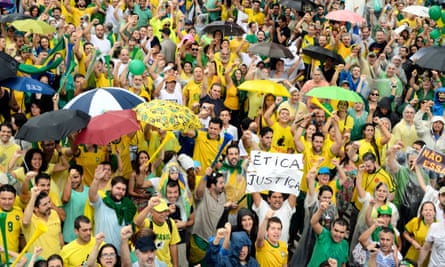
“We are seeing some of the most powerful men in Brazil go to jail. In the medium term, we’re heading for a better place,” said Gerson Camarotti, a Globo journalist who has covered politics in Brasilia for 20 years. “At any other time in recent history, there would have been a deal. This scandal would have been investigated in congress and dealt with in congress. But this time, we have a new generation of young prosecutors and judges who don’t have political connections. Nobody controls them.”
With that popularity has come more power for the judiciary relative to the legislature. For the first time since the return of democracy in 1985, federal police last month arrested a serving senator – Delcídio do Amaral – for trying to pervert the course of the investigation. His detention, which had to be approved by the supreme court and endorsed by the upper house, has prompted hopes that other congressmen who have been charged with crimes may finally face justice.
Silvio Costa, a deputy leader of the house from the government camp, told the Guardian earlier this year that the investigation would lead to the greatest jailing of congressmen in world history.
He drew parallels with Operation Clean Hands in Italy – where an investigation into state-contract bribery brought down the nation’s postwar political system. For Costa, this would be no bad thing. “There have been centuries of sickness since Brazil was founded. Now we have the medication and the personnel to find a cure. The country is going to come out better from this process.”
The Workers party administration claims credit for the change represented by the investigation.

“This is happening because Lula and Dilma gave a great deal of independence to the public prosecutors and federal police,” Edinho Silva, the communications minister, told the Guardian. “I think there are few countries in the world that would give such autonomy to an investigation like this that involves many of the most important leaders in the country.”
But how much further the investigation will go remains to be seen. There is already a backlash. The jurisdiction of part of the case has been taken from Curitiba. There are also efforts to drag judicial agents into the political mire. Some on the left accuse prosecutors – some of whom were trained by the US Federal Bureau of Investigation – of collusion in what they see as an attempted coup against Rousseff.
Dallagnol denies political bias in an investigation that has encompassed politicians from almost every party.
He said he wants the case to stimulate debate and prompt a shift in public ethics. To this end, he has suggested a 10-point anti-corruption plan, which has drawn more than 1.1 million online supporters.
“We know a lot of people put their hopes in us. We know we can’t deliver all the changes they want so we propose changes in the law,” he said. “This case won’t change Brazil, but it can be a lever for society. Society is the main actor, not us.”
Additional reporting by Shanna Hanbury


